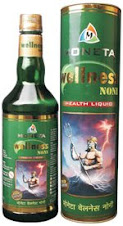'PILOT STUDY OF MONETA WELLNESS NONI IN GYNECOLOGICAL DISORDERS"
ABSTRACT
Menstrual disorders are a common manifestation. Since they often have a multifactorial aetiology, they pose a problem in effective treatment. Hormonal imbalances can be rectified by hormonal therapy but this is not devoid of side-effects. Moreover, this form of treatment is not well tolerated in some cases. Concurrently, vast research has been conducted on the usefulness of herbal formulations in menstrual disorders as a result of which the efficacy of certain herbs has been proven. With this in view, an herbal preparation MONETA WELLNESS NONI, a tonic was formulated using herbs whose potency was confirmed in this disorder. The effect of this uterine tonic was studied.
KEY WORDS: Uterine tonic, menorrhagia, dysmenorrhoea, leukorrhoea
INTRODUCTION
Abnormal uterine bleeding is a manifestation commonly encountered during a woman's reproductive phase and approximately 20% of the female patients visiting a general gynaecologist are women with this problem1. About one half of all patients who experience this problem are over 40 years of age and about 20% are adolescents2. Among adolescents presenting with menstrual problems, about 50% constitute abnormal uterine bleeding and dysmenorrhoea3. More than 6 lack hysterectomies are performed every year in United State. About 40-50% of women have had hysterectomy for being reasons, for excessive menstrual bleeding (U.T. South Western Medical Center, 2005 & Obstet. Gynecol. 2002). When administering treatment to a patient with abnormal uterine bleeding, it should be borne in mind that menstruation is not a purely physical phenomenon4 – the awareness of its onset, regularity and associated discomfort are strongly influenced by psychologic and cultural factors5. Because menstruation is a normal process, it does have the ability to readjust itself after abnormal bleeding. For this reason, many therapies in the past have been considered to be successful when, in fact, they may have no scientific basis and are empirically instituted.
In today's era, a horizon of the Ayurvedic treatment in regard to Stri-roga has increased extremely. For Almost all Gynecological Problems, patients are turning to the Ayurvedic treatment modality. Menstrual problem are commonest complaints of the women population throughout the world. Among these, up to 33% cases are excessive and irregular menstrual bleeding. Incidences of patients with excessive and irregular menses advice to undergo hysterectomy are increasing day by day leading to disastrous psychiatric complaints among the women.
An effort was made in this direction to evaluate the effect of an Ayurvedic Preparation. With this aim, the present study entitled as 'PILOT STUDY OF MONETA WELLNESS NONI IN GYNECOLOGICAL DISORDERS" was carried out.
MATERIAL AND METHODS
28 female patients in the reproductive age group of 19-45 years with a history of abnormal uterine bleeding were enrolled. Their records showed that they encountered these symptoms consistently for the past 6 months. These patients were not on any hormonal therapy during and one month prior to the trial. History taking consisted of detailed information with due importance on psychogenic, emotional factors, family history and drug intake. The patients were subjected to a thorough physical examination, which also included per speculum visual examination to rule out any underlying uterine pathology.
The objective of the study was to evaluate whether Moneta wellness Noni:
n Controls excess bleeding occurring in the menstrual cycle
– Prevents dysmenorrhoea
– Controls physiologic leucorrhoea
– Re-establishes cyclical bleeding
Each patient enrolled in the trial was administered 5 ml of Moneta Wellness Noni Tonic t.i.d. for duration of 3 months. They were followed up at regular intervals to evaluate the effect of the drug and to rule out any side effects.
The selected patients were divided into the following groups:
| Menorrhagia |
| Metrorrhagia |
| Dysmenorrhoea |
| Dysmenorrhoea + menorrhagia |
| Physiological leucorrhoea |
Patients in the menorrhagia group had a history of bleeding per vagina lasting for 12-14 days. Though they had a regular menstrual cycle, bleeding was profuse and in clots. After one month of treatment with Moneta Wellness Noni. They reported a slight decline in bleeding. By the end of 3 months of the study, all the subjects noticed a significant decrease in bleeding and the duration of flow had reduced to 6-8 days.
In the group of patients with metrorrhagia, irregular cycles occurred at a mean interval of 20-24 days. Ten subjects reported that they had bleeding for 8-10 days. After 3 months of treatment, it was observed that the bleeding decreased to 4-7 days and the interval between 2 cycles increased by 4-5 days. Two patients discontinued without prior information. patients enrolled in the dysmenorrhoea group, as the others had associated dysfunctional uterine bleeding. These patients complained of pain in the abdomen which started on the first day of the cycle and lasted for 2 days. The pain was severe and required antispasmodics; however, they were advised to discontinue all other medication during the period of treatment with Moneta Wellness Noni. Within one month of treatment, patients reported complete regression of symptoms, which did not recur during the subsequent months of the trial.
Patients with history of white discharge per vagina had other complaint like moderate to severe back ache was also associated. Significant effect on physiological leucorrhoea as well as backache was also reduced remarkably.
In patients of dysmenorrhoea + menorrhagia, dysmenorrhoea was completely cured in all patients while menorrhagia was normalised in 65% patients.
By the end of the trial, none of the subjects reported any side effects.
CONCLUSION
Taking into consideration the results of the trial and the proven reports of the herbs used in the formulation, it can be concluded that Moneta Wellness Noni can effectively avert the multifactorial aetiology of dysmenorrhoea and leukorrohea, without producing any undesirable side effects. However, a larger trial is proposed to ensure the exact mechanism of action of the drug and to evaluate its efficacy in a larger perspective.
